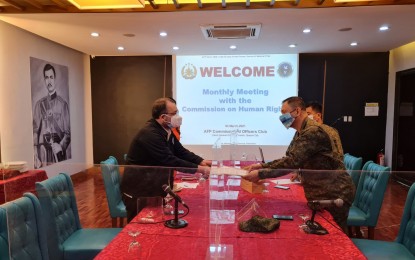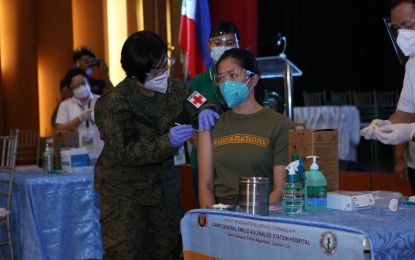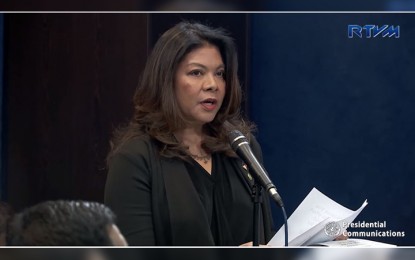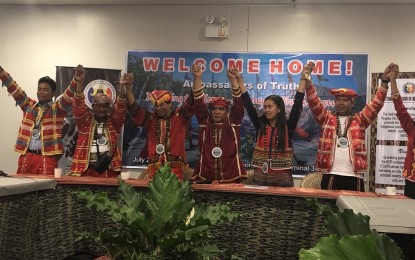From the Philippine News Agency (Mar 4, 2021): Reds behind 141 incidents of anti-personnel mine use: AFP (By Priam Nepomuceno)

FIGHTING NPA ATROCITIES. AFP Human Rights Office chief, Col. Joel Alejandro Nacnac (right) hands over the report on the NPA's use of anti-personnel mines to Commission on Human Rights chairperson Chito Gascon (left) during a meeting in Camp Aguinaldo on Thursday (March 4, 2021). The report said the communist terrorist group is behind 141 incidents of use, stockpiling, transport and production of anti-personnel mines or landmines which has so far caused 224 casualties since 2010. (Photo courtesy of AFP Human Rights Office)
The Armed Forces of the Philippines (AFP) on Thursday confirmed that the communist movement is behind a total of 141 incidents of use, stockpiling, transport and production of anti-personnel mines or landmines which have so far caused 224 casualties since 2010.
“The number of reported incidents from 2010 to date has risen to 141 incidents that resulted in the death of 32 military personnel and five civilians, and wounding of 163 soldiers and 24 civilians for a total of 224 casualties. Data collected by our Office from field units provides a factual and verifiable basis for the report,” AFP Human Rights Office (AFPHRO) chief Col. Joel Alejandro S. Nacnac said in his report.
He added that they have already submitted to the Commission on Human Rights (CHR) for appropriate action a list of these incidents which covers incidents using land mines that killed, maimed, or injured civilians and AFP personnel.
Nacnac said these incidents are mostly perpetrated by the Communist Party of the Philippines-New People’s Army-National Democratic Front (CPP-NPA-NDF).
"The CPP-NPA-NDF’s acts of using, stockpiling, transporting and producing land mines is a clear violation of RA (Republic Act) 9851 which penalizes as a war crime the employment of means of warfare prohibited under international law, such as weapons, projectiles, materials and methods of warfare that cause superfluous injury or unnecessary suffering or which are inherently indiscriminate when inflicted on soldiers and civilians,” he added.
The year 2020 has shown to have the highest number of incidents at 68, followed by 24 in 2017 and 20 in 2019. Eastern Visayas has 68 reported casualties followed by Cagayan Valley and the Cordillera Administrative Region, both with 31.
Bicol Region has the highest number of reported incidents of actual use of anti-personnel mines by the communist terrorists with 19 incidents, followed by Eastern Visayas with 17, and Davao Region with 12.
The report was also submitted by AFPHRO to the Philippine Human Rights Committee, International Committee of the Red Cross delegation in the Philippines, Administrative Order 35 Secretariat and the Office of the United Nations International Organizations of the Department of Foreign Affairs.
It will also be submitted to the UN Resident Coordinator in the Philippines and the Senior Human Rights Adviser of the Office of the High Commissioner on Human Rights to the Philippines.
Nacnac also informed the public of the resolution adopted by the United Nations (UN) General Assembly on Dec. 8, 2005 which declared the 4th of April of each year as International Day for Mine Awareness and Assistance in Mine Action.
“The UN resolution called for continued efforts by States, with support from the UN and other concerned organizations, to help establish and develop national mine-action capacities in countries where mines constitute a serious threat to the lives of people. The day aims to raise awareness about landmines and progress toward their eradication. The Mine Awareness Day is a global observance and not a public holiday,” Nacnac said.
As part of its mandate, the AFPHRO continues to monitor Human Rights and International Humanitarian Law violations by non-State armed groups such as the CPP-NPA-NDF including the use of anti-personnel or land mines that have maimed or permanently injured soldiers and civilians.
“With the assistance and support of the Commission on Human Rights, we may be able to put a stop to the CPP-NPA-NDF’s criminal acts. The AFP, through the Human Rights Office, will continuously coordinate with the appropriate agencies in this whole-of-nation approach towards just and lasting peace,” Nacnac said.
The CPP-NPA, which has been waging a five-decade armed struggle against the government, is listed as a terrorist organization by the United States, the European Union, the United Kingdom, Australia, Canada, New Zealand, and the Philippines.
https://www.pna.gov.ph/articles/1132567



